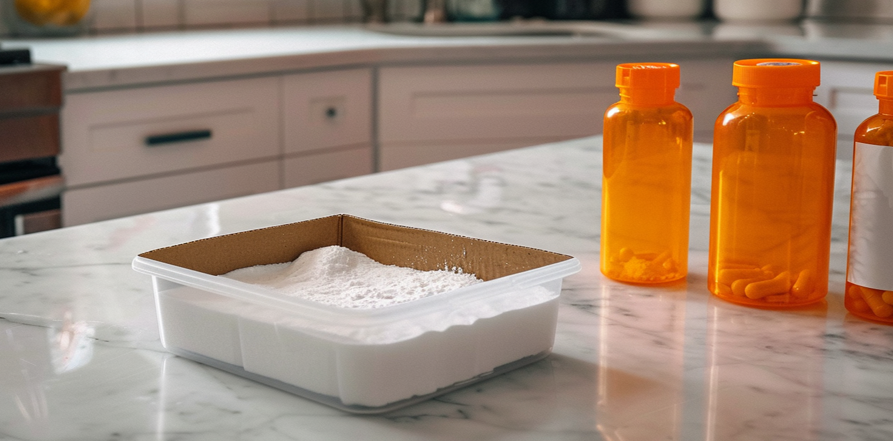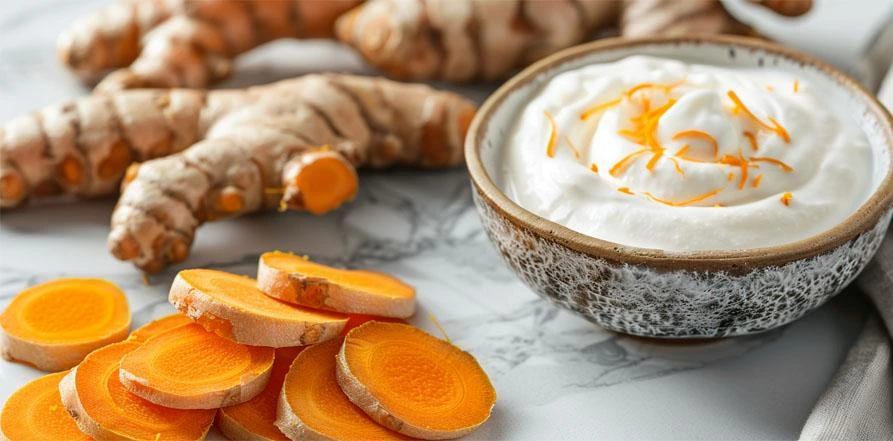By Donnie Yance
Is baking soda for cancer a valid idea? Cancer (The Cancer Energy/Intelligence) alters the tumor microenvironment in several ways, and one of them is by creating an acidic zone around the tumor that promotes cancer progression and treatment resistance. Recent research suggests that sodium bicarbonate (baking soda) or potassium bicarbonate supplementation can offer significant benefits for prostate and other cancer patients by neutralizing this tumor acidity.
Sodium bicarbonate, commonly known as baking soda, serves multiple clinical purposes beyond its well-established role as an antacid for treating gastric hyperacidity. Recent research by Chao et al.1 has demonstrated promising applications in oncology through a novel approach targeting intratumor lactic acidosis during chemoembolization procedures. Chemoembolization is a treatment where chemotherapy drugs are delivered directly to a tumor, while simultaneously blocking the tumor’s blood supply to reduce side effects and maximize drug concentration at the tumor site. In their clinical trial, the researchers modified conventional chemoembolization by incorporating a 5% sodium bicarbonate solution alongside standard cytotoxic drugs, achieving remarkably high local tumor control rates. This use of baking soda for cancer by injecting it directly into the tumor has profound implications. The underlying mechanism for sodium bicarbonate’s antitumor efficacy appears to be its ability to neutralize the acidic tumor microenvironment, which typically promotes cancer cell proliferation and therapeutic resistance.2
Cancer tumors are more acidic than normal tissues. While healthy tissues maintain a neutral environment, tumors have acidic surroundings. This acidity comes from how cancer cells process energy, which varies depending on their location within the tumor.
Tumors can be divided into three main regions based on oxygen availability:
- Areas far from blood vessels: These regions receive very little oxygen. Cancer cells here can only produce energy through a process called glycolysis, which creates acid as a byproduct.
- Middle regions with moderate oxygen: Here, cancer cells use various fuel sources including proteins, fats, and waste products from other cells. They can use oxygen more efficiently in this environment, producing carbon dioxide.
- Areas near blood vessels: Even though these regions have plenty of oxygen, cancer cells still prefer to use glycolysis for energy (a phenomenon called the Warburg effect), which continues to contribute to the acidic environment.
This unique acid-producing metabolism helps cancer cells survive and grow in challenging conditions.3
It is essential to understand the fundamentals of pH regulation to meet the challenge of targeting tumor metabolism and acidosis as an anti-tumor approach.
- The regulation of the cellular hydrogen potential (pH) is a key step that controls many vital cellular processes such as energy balance, cell proliferation, and migration of all mammalian cells.
- Extracellular tumor acidosis is an indicator of poor prognosis and facilitates tumor invasion by the degradation of the extracellular matrix
- Acid reduces immunosurveillance by inhibiting the activity of natural
killer (NK) cells and the cytolytic activity of cytotoxic T lymphocytes.4
Lactic acid in the tumor microenvironment suppresses the antitumor immune response by negatively regulating innate and adaptive tumor-infiltrating immune cells.5
6
How Tumor Acidity Affects Cancer
Cancer cells exhibit what researchers call “pH gradient reversal” – their intracellular environment becomes abnormally alkaline while the extracellular environment becomes acidic.7,8 This dysregulation:
- Promotes invasion and metastasis 9
- Supports cancer stem cell survival 10
- Creates resistance to chemotherapy and immunotherapy 11, 12
- Enables evasion of immune surveillance 13
A study published in Reviews of Physiology, Biochemistry, and Pharmacology specifically examined pH dysregulation in prostate cancer, finding that acid-extruding transporters are upregulated in prostate tumors, making significant contributions to progression. 14
Experiments utilizing a mouse prostate cancer model demonstrated that administering 200 mM bicarbonate to 4-week-old mice with prostate cancer (weaned at 3 weeks of age) significantly inhibited the progression from in situ carcinoma to microinvasive disease. 15
Oral bicarbonate reversed tumor acidosis and activated NK cells and induced NK Cell-dependent lymphoma control without other therapies. 16
Potential Benefits of Bicarbonate Therapy (Baking Soda) For Cancer
Baking soda for cancer– Oral sodium or potassium bicarbonate supplementation may:
- Neutralize the acidic tumor microenvironment 17
- Reduce metastatic potential 18
- Enhance effectiveness of conventional treatments 19
- Improve immune system recognition of cancer cells 20
Clinical trials have shown promising results with alkalization therapy (including bicarbonate supplementation) in several cancer types, with one study showing significantly improved survival rates for patients who achieved higher urine pH levels.21
Several in vitro and in vivo studies reported that neutralization of the acidic tumor microenvironment by alkalizing agents, such as bicarbonate, resulted in the suppression of cancer progression and a potential benefit for anti-cancer drug responses.22
23
Practical Application
While specific protocols should be developed with healthcare providers, the research suggests:
- Monitoring urine pH (target: 7.0-7.5 slightly alkaline)
- Oral bicarbonate supplementation (potassium or sodium bicarbonate)
- Combining with an alkalizing diet rich in vegetables and fruits
- Potentially enhancing both chemotherapy and immunotherapy outcomes.24,25
Twelve patients with Small cell lung cancer (SCLC) in the intervention group (receiving both alkalization therapy and vitamin C treatment together with chemotherapy) were retrospectively compared to 15 patients with SCLC in the control group (receiving chemotherapy only).
The mean urine pH of the intervention group was significantly higher (more alkaline) than that of the control group. The median overall survival for the intervention group was 44.2 months, as compared with 17.7 months for the control group.26
In mice, treatment with bicarbonate and immunotherapy reduced melanoma and pancreatic tumor growth when compared to single-agent treatment.27
This approach addresses cancer as a metabolic disease and targets the Warburg effect (cancer’s preference for glycolysis or burning sugar for fuel), offering a complementary strategy to conventional prostate cancer treatments. 28, 29

Why Potassium Bicarbonate Is Superior to Sodium Bicarbonate
Potassium bicarbonate represents a superior alternative to sodium bicarbonate for several important reasons:
Better cardiovascular profile: Unlike sodium bicarbonate, potassium bicarbonate doesn’t raise blood pressure. In fact, potassium supplementation often helps reduce hypertension and supports heart health, making it a clearly better choice for those with cardiovascular concerns.30, 31, 32
Superior mineral balance: The typical Western diet already contains excess sodium while being deficient in potassium. Potassium bicarbonate helps correct this imbalance, providing an essential mineral many people lack.33
More effective cellular alkalinization: Potassium works more efficiently than sodium at transporting alkalizing compounds into cells, potentially making potassium bicarbonate more effective at neutralizing intracellular acidity. 34
Reduced edema risk: Sodium bicarbonate can cause water retention and swelling in some individuals, while potassium bicarbonate typically doesn’t produce these side effects.35
Bone health benefits: Research indicates potassium bicarbonate helps reduce calcium loss in urine and may support bone density maintenance, an advantage not shared by sodium bicarbonate.36, 37
For these reasons, potassium bicarbonate is generally considered the preferred alkalizing agent when addressing tissue acidity concerns, particularly in the context of tumor microenvironments. Clinical experience suggests that a combination of potassium and sodium bicarbonate often yields optimal results. This combination approach has demonstrated significant efficacy in practice, unless contraindicated in patients with sodium sensitivity or those following sodium-restricted protocols.
While not as readily available as baking soda, food-grade potassium bicarbonate is very easy to find as a supplement online.
The Role of Alkalizing Foods in Cancer Support
While an alkalizing diet is not a stand alone treatment for cancer, emerging research suggests it may play a supportive role in creating an internal environment less favorable to cancer progression. The foods listed above not only help balance your body’s pH but also provide essential nutrients, antioxidants, and anti-inflammatory compounds that support immune function and overall health during cancer treatment.
Beneficial Alkalizing Foods for Cancer Support
Research suggests that creating a more alkaline internal environment may support overall health during cancer treatment. Here are alkalizing (or neutral) foods and beverages to consider incorporating into your diet:
Plant-Based Proteins
- Soy products (organic recommended): miso, edamame, tofu, and tempeh
- Legumes: beans, lentils, and chickpeas
Dairy Alternatives and Fermented Foods
- Plant-based yogurts, such as coconut (unsweetened)
- Whole milk yogurt from grass-fed sources (sheep, goat, or cow)
Vegetables
- Leafy greens: spinach, kale, collard greens, and swiss chard
- Cruciferous vegetables: broccoli, cauliflower, and brussels sprouts
- Root vegetables: potatoes (especially sweet potatoes)
- Sea vegetables: kelp, spirulina, and chlorella
Fruits
- Berries: blueberries, strawberries, and blackberries
- Citrus fruits (despite their acidity, they have an alkalizing effect when metabolized)
- Figs, dates, and apples
Grains and Seeds
- Ancient grains: quinoa, millet, and amaranth
- Seeds: chia, flax, and hemp
Herbs, Spices, and Beverages
- Fresh herbs: basil, parsley, and cilantro
- Anti-inflammatory spices: turmeric, ginger, and cinnamon
- Herbal teas: green tea, chamomile, and dandelion root
Healthy Fats
- Olive oil (extra virgin, cold-pressed)
- Avocados
- Nuts and seeds: almonds, walnuts, and pumpkin seeds
Remember that dietary changes should complement, not replace, conventional and holistic medical treatments. Work closely with your healthcare team, including an oncologist and registered dietitian who specializes in oncology nutrition, to develop a personalized eating plan tailored to your specific type of cancer, treatment protocol, and nutritional needs.
Stay consistent with your alkalizing food choices while maintaining adequate protein intake and caloric needs, especially during treatment. Monitor how your body responds to dietary changes and adjust accordingly. By mindfully incorporating these alkalizing foods into your daily meals, you’re taking a proactive step toward supporting your body’s natural healing processes.
Conclusion
While baking soda for cancer has been a controversial topic, recent research shows that cancer creates an acidic environment that helps it grow and resist treatment. Scientists have discovered that using baking soda, or even better, potassium bicarbonate, helps to make the environment around tumors less acidic. This can slow cancer growth, improve the effects of treatments like chemo and immunotherapy, and support the immune system’s ability to fight cancer. In addition to bicarbonate therapy, eating a diet rich in alkalizing foods like leafy greens, berries, and plant-based proteins also helps create a healthier internal environment. Although these strategies show promise, they should always be used alongside standard cancer treatments and under the guidance of an integrated healthcare team. Taking small, consistent steps to improve your body’s pH balance can give you another tool in the journey toward more complete wellness.
About the Author:
Donald R. Yance is the founder of the Mederi Center. A Clinical Master Herbalist and Certified Nutritionist, Donnie is renowned for his extraordinary knowledge and deep understanding of the healing properties of plants and nutrition, as well as of epigenetics, laboratory medicine, oncologic pathology, and molecular oncology. He is a professional member of the American Herbalists Guild, National Association of Nutrition Professionals, Academy of Integrative Health and Medicine, and the Society for Integrative Oncology.
References:
1. Chao M, Wu H, Jin K, et al. A nonrandomized cohort and a randomized study of local control of large hepatocarcinoma by targeting intratumoral lactic acidosis. eLife. 2016;5:e15691.
2. Ribeiro MD, Silva AS, Bailey KM, Kumar NB, Sellers TA, Gatenby RA, Ibrahim-Hashim A, Gillies RJ. Buffer Therapy for Cancer. J Nutr Food Sci. 2012 Aug 15;2:6. PMID: 24371544; PMCID: PMC3872072.
3. Yang M, Zhong X, Yuan Y. Does Baking Soda Function as a Magic Bullet for Patients With Cancer? A Mini Review. Integr Cancer Ther. 2020 Jan-Dec;19:1534735420922579. doi: 10.1177/1534735420922579. PMID: 32448009; PMCID: PMC7249593.
4. Chiche J, Brahimi-Horn MC, Pouysségur J. Tumour hypoxia induces a metabolic shift causing acidosis: a common feature in cancer. J Cell Mol Med. 2010 Apr;14(4):771-94. doi: 10.1111/j.1582-4934.2009.00994.x. Epub 2009 Dec 8. PMID: 20015196; PMCID: PMC3823111.
5. Wang, Joy, et. al., Lactic Acid and an Acidic Tumor Microenvironment suppress Anticancer Immunity, Int. J. Mol. Sci. 2020, 21, 8363; doi:10.3390/ijms21218363
6. Matthew L. Goodwin1,2*, L. Bruce Gladden3, MaartenW. N. Nijsten4 and Kevin B. Jones, Lactate and cancer: revisiting the Warburg effect in an era of lactate shuttling, Frontier, www.frontiersin.org January 2015 | Volume 1 | Article 27 | 1 doi: 10.3389/fnut.2014.00027
7. Sharma M, et al. pH Gradient Reversal: An Emerging Hallmark of Cancers. Recent Patents on Anti-Cancer Drug Discovery. 2015;10:244-258.
8. Cardone RA, Casavola V, Reshkin SJ. The Role of Disturbed pH Dynamics and NA+/H+ Exchanger in Metastasis. Nat Rev Cancer. 2005;5:786-95.
9. Gatenby RA, Gawlinski ET. A reaction-diffusion model of cancer invasion. Cancer Research. 1996;56(24):5745-5753.
10. Lock FE, et al. Targeting carbonic anhydrase IX depletes breast cancer stem cells within the hypoxic niche. Oncogene. 2013;32(44):5210-9.
11. Pillai SR, et al. Causes, Consequences, and Therapy of Tumors Acidosis. Cancer Metastasis Rev. 2019;38:205-22.
12. Pilon-Thomas S, et al. Neutralization of Tumor Acidity Improves Antitumor Responses to Immunotherapy. Cancer Res. 2016;76(6):1381-90.
13. Yang M, Zhong X, Yuan Y. Does Baking Soda Function as a Magic Bullet for Patients With Cancer? A Mini Review. Integr Cancer Ther. 2020 Jan-Dec;19:1534735420922579. doi: 10.1177/1534735420922579.
14. Fliegel L. Role of pH Regulatory Proteins and Dysregulation of pH in Prostate Cancer. Rev Physiol Biochem Pharmacol. 2020;10.1007/112_2020_18.
15. Ibrahim-Hashim A, Cornnell HH, Abrahams D, et al. Systemic buffers inhibit carcinogenesis in TRAMP mice. J Urol. 2012;188:624-631.
16. Pötzl J, Roser D, Bankel L, Hömberg N, Geishauser A, Brenner CD, Weigand M, Röcken M, Mocikat R. Reversal of tumor acidosis by
17. Ibrahim-Hashim A, Estrella V. Acidosis and cancer: from mechanism to neutralization. Cancer Metastasis Rev. 2019;38(1-2):149-155.
18. Robey IF, et al. Bicarbonate increases tumor pH and inhibits spontaneous metastases. Cancer Res. 2009;69(6):2260-8.
19. Hamaguchi R, et al. Effects of Alkalization Therapy on Chemotherapy Outcomes in Advanced Pancreatic Cancer: A Retrospective Case-Control Study. In Vivo. 2020;34(5):2623-2629.
20. Chao M, et al. A nonrandomized cohort and a randomized study of local control of large hepatocarcinoma by targeting intratumoral lactic acidosis. eLife. 2016;5:e15691.
21. Isowa M, et al. Potential of Alkalization Therapy for the Management of Metastatic Pancreatic Cancer: A Retrospective Study. Cancers. 2023;16(1):61.
22. Hamaguchi R, Isowa M, Narui R, Morikawa H, Wada H. Clinical review of alkalization therapy in cancer treatment. Front Oncol. 2022 Sep 14;12:1003588. doi: 10.3389/fonc.2022.1003588.
23. Yang M, Zhong X, Yuan Y. Does Baking Soda Function as a Magic Bullet for Patients With Cancer? A Mini Review. Integr Cancer Ther. 2020 Jan-Dec;19:1534735420922579. doi: 10.1177/1534735420922579.
24. Hamaguchi R, et al. Improved Chemotherapy Outcomes of Patients With Small-cell Lung Cancer Treated With Combined Alkalization Therapy and Intravenous Vitamin C. Cancer Diagnosis & Prognosis. 2021;1:157-163.
25. Isowa M, et al. Potential of Alkalization Therapy for the Management of Metastatic Pancreatic Cancer: A Retrospective Study. Cancers. 2023;16(1):61.
26. Hamaguchi R, et al. Improved Chemotherapy Outcomes of Patients With Small-cell Lung Cancer Treated With Combined Alkalization Therapy and Intravenous Vitamin C. Cancer Diagnosis & Prognosis. 2021;1:157-163.
27. Pilon-Thomas S, Kodumudi KN, El-Kenawi AE, Russell S, Weber AM, Luddy K, Damaghi M, Wojtkowiak JW, Mulé JJ, Ibrahim-Hashim A, Gillies RJ. Neutralization of Tumor Acidity Improves Antitumor Responses to Immunotherapy. Cancer Res. 2016 Mar 15;76(6):1381-90. doi: 10.1158/0008-5472.CAN-15-1743. Epub 2015 Dec 30. Erratum in: Cancer Res. 2017 May 1;77(9):2552. PMID: 26719539; PMCID: PMC4829106.
28. Wada H, et al. Meaning and Significance of “Alkalization Therapy for Cancer”. Front Oncol. 2022;12:920843.
29. Seyfried TN, Shelton LM. Cancer as a Metabolic Disease. Nutr Metab. 2010;7:7.
30. Adroguè HJ, Madias NE. Sodium and potassium in the pathogenesis of hypertension. N Engl J Med. 2007;356(19):1966-1978. doi:10.1056/NEJMra064486
31. Aburto NJ, Hanson S, Gutierrez H, et al. Effect of increased potassium intake on cardiovascular risk factors and disease: systematic review and meta-analyses. BMJ. 2013;346:f1378. doi:10.1136/bmj.f1378
32. He FJ, MacGregor GA. Potassium intake and blood pressure. Am J Hypertens. 2001;14(6 Pt 1):585-592. doi:10.1016/s0895-7061(00)01269-6
33. Sebastian A, Frassetto LA, Sellmeyer DE, Morris RC Jr. The evolution-informed optimal dietary potassium intake of human beings greatly exceeds current and recommended intakes. Semin Nephrol. 2006;26(6):447-453. doi:10.1016/j.semnephrol.2006.10.003
34. Palmer BF. Regulation of Potassium Homeostasis. Clin J Am Soc Nephrol. 2015 Jun 5;10(6):1050-60. doi: 10.2215/CJN.08580813. Epub 2014 Apr 10. PMID: 24721891; PMCID: PMC4455213.
35. Frassetto L, Morris RC Jr, Sebastian A. Potassium bicarbonate reduces urinary nitrogen excretion in postmenopausal women. J Clin Endocrinol Metab. 1997;82(1):254-259. doi:10.1210/jcem.82.1.3663
36. Jehle S, Hulter HN, Krapf R. Effect of potassium citrate on bone density, microarchitecture, and fracture risk in healthy older adults without osteoporosis: a randomized controlled trial. J Clin Endocrinol Metab. 2013;98(1):207-217. doi:10.1210/jc.2012-3099
37. Dawson-Hughes B, Harris SS, Palermo NJ, et al. Treatment with potassium bicarbonate lowers calcium excretion and bone resorption in older men and women. J Clin Endocrinol Metab. 2009;94(1):96-102. doi:10.1210/jc.2008-1662







